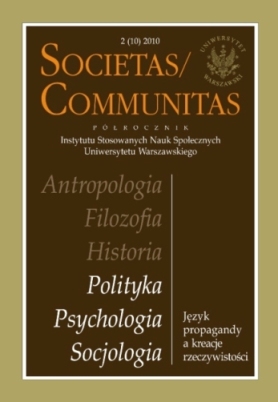Między polemiką a paranoją. Współczesny dyskurs antysemicki, jego odmiany i wyznaczniki językowe
Between Polemics and Paranoia. Contemporary Anti-Semitic Discourse, Its Variations and Linguistic Indicators
Author(s): Kajetan MojsakSubject(s): Social Sciences
Published by: Instytut Stosowanych Nauk Społecznych Uniwersytetu Warszawskiego
Summary/Abstract: The article focuses on the contemporary anti-Semitic discourse, its variations, as well as its linguistic indicators. Discussed are the key elements of anti-Semitic discourse as such (essentializing evil in the character of the Jew-enemy; using conspiracy theory to explain reality; concealments and presuppositions; “anti-dialogism” of sorts which is manifest on the level of linguistic formulation of texts; and others). Furthermore, the characteristic features of contemporary variations of the anti-Semitic discourse are mentioned, including, among others, the religious and racial criteria which have been playing a lesser role than before; the increasing separation from the real social context; as well as the almost purely phantasmic character and unique form of self-reference (i.e. clearly or indirectly anti-Semitic statements made during debates on anti-Semitism). The article draws attention to the new and unique environment in which anti-Semitic language is being developed: the internet (with the formation of virtual communities connected through a shared perception of the world; “democratization” and ease of publishing, lowered linguistic and stylistic standards, as well as a lack of moral censorship). In reference to Gavin Langmuir’s categorization of stereotypes and prejudices – realistic, xenophobic and chimerical – a basic classification of anti-Semitic language is made, although the result is rather a continuum than a clear division.
Journal: Societas/Communitas
- Issue Year: 2010
- Issue No: 10 (2)
- Page Range: 119-140
- Page Count: 21
- Language: Polish

